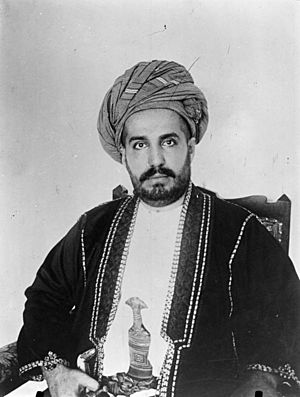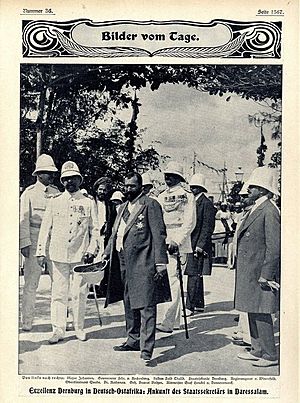Khalid bin Barghash of Zanzibar facts for kids
Quick facts for kids Khalid bin Barghashخالد بن برغش (Arabic) |
|||||
|---|---|---|---|---|---|
 |
|||||
| Sultan of Zanzibar | |||||
| Reign | 25–27 August 1896 | ||||
| Predecessor | Hamad bin Thuwaini | ||||
| Successor | Hamoud bin Mohammed | ||||
| Born | 1874 Zanzibar |
||||
| Died | 1927 (aged 52–53) Mombasa, Colony and Protectorate of Kenya |
||||
|
|||||
| House | Al Said | ||||
| Father | Barghash bin Said | ||||
| Religion | Ibadi Islam | ||||
Sayyid Khalid bin Barghash Al-Busa'id (Arabic: خالد بن برغش البوسعيد) was the sixth Sultan of Zanzibar. He ruled for a very short time in 1896. His rule led to the shortest war in history.
Contents
Biography of Khalid bin Barghash
Khalid bin Barghash was born in 1874 in Zanzibar. He was the second son of Barghash bin Said. His father was the second Sultan of Zanzibar.
First Attempt to Become Sultan
When Khalid was 16, the Sultan of Zanzibar, Sayyid Khalifa bin Said, died. This was in 1890. Sayyid Ali bin Said Al-Busa'id became the new Sultan. Around this time, a treaty was signed between Germany and the United Kingdom. This treaty made Zanzibar a British protectorate. This meant Britain had a lot of control over the island.
In 1893, when Khalid was 19, the British Consul, Rennell Rodd, arrived. The current Sultan was very ill. People started talking about who would be the next Sultan. Khalid was one of the possible choices. He was the son of a former Sultan, which gave him a strong claim. However, the British did not want him to be the next ruler.
When the Sultan died, Khalid tried to enter the palace. But the British quickly sent 200 marines with machine guns. They surrounded the palace. Khalid was told he could not be Sultan. Instead, Sayyid Hamad bin Thuwaini Al-Busa'id was chosen. He agreed to the conditions set by the British. Khalid was arrested and taken to his home.
The Shortest War in History
In 1896, similar events happened again, but on a bigger scale. Khalid briefly became Sultan of Zanzibar. This happened from August 25 to August 27, 1896. He took power after his cousin, Hamad bin Thuwaini, died suddenly. Many people believed Khalid had poisoned him.
Great Britain did not agree with Khalid becoming Sultan. They had a treaty from 1866. This treaty said a new Sultan could only rule with British approval. This disagreement led to the Anglo-Zanzibar War. This war is known as the shortest war in history.
During this "war," British navy ships fired cannons at Khalid's palace. The shelling lasted only 38 minutes. After this, Khalid's forces surrendered. About 500 of Khalid's men were hurt or killed. The British took control. Khalid escaped his palace through a back door. He found safety in the German consulate.
The British Consul, Basil Cave, reported on Khalid's situation. He said Khalid stayed inside the German consulate. German sailors guarded the doors. The British kept a close watch on the consulate.
In October 1896, the German Consul, Albrecht von Rechenberg, wrote to the British. He said his government had ordered him to send Khalid to Dar es Salaam. He promised that Khalid would not touch Zanzibari soil during the journey.
Life in Exile
Khalid was taken by a German ship, the SMS Seeadler, to Dar es Salaam. This ship was anchored outside the German consulate. This way, Khalid did not step on Zanzibari land. In German East Africa, he was given political asylum. This means he was allowed to live there safely.
In Dar es Salaam, Khalid lived like a royal person in exile. He had a grand house. He was even allowed to fly the red flag of the Sultanate of Zanzibar. He attended important government events.
Second Exile and Death
During the First World War, British forces captured Khalid. This happened around 1917, possibly in Dar es Salaam. He was then sent to Saint Helena. This is the same island where Napoleon was once exiled. Later, he was moved to the Seychelles.
Khalid asked many times to return to East Africa. Finally, Winston Churchill, who was a government minister at the time, agreed. In 1922, Churchill allowed Khalid to live in Mombasa. Khalid died in Mombasa on March 19, 1927. This was five years after he returned to Mombasa.
While he was in exile in the Seychelles, he could not use his large properties. These properties were located around Mombasa. He also could not get the money from them.
Khalid's Family
Khalid had at least five sons and one daughter. Eventually, his children were allowed to return to Zanzibar. However, their only remaining property was in Dar es Salaam. One of his sons, Majid, helped to create a Swahili-English Dictionary.
See also
 In Spanish: Khalid ibn Barghash de Zanzíbar para niños
In Spanish: Khalid ibn Barghash de Zanzíbar para niños
 | Jewel Prestage |
 | Ella Baker |
 | Fannie Lou Hamer |


